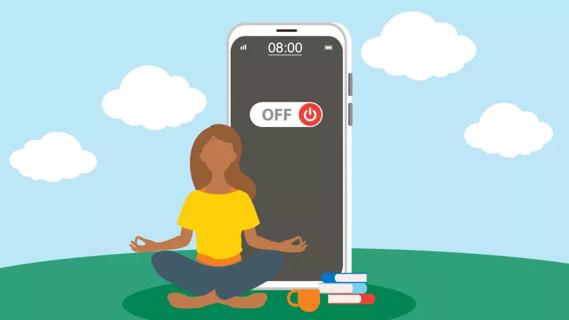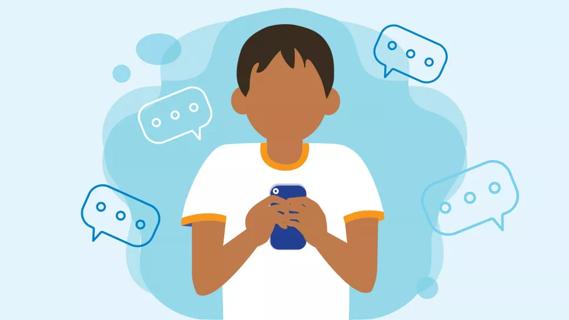Embrace mindfulness and practice checking your phone consciously, not compulsively

The term “doomscrolling” first caught on in early 2020, right around the time the world went into a pandemic-induced lockdown. It’s a bleak-sounding word that seems to perfectly capture our societal tendency to take in a torrent of bad news while mindlessly scanning social media.
Advertisement
Cleveland Clinic is a non-profit academic medical center. Advertising on our site helps support our mission. We do not endorse non-Cleveland Clinic products or services. Policy
Can you relate? Whether it’s through Facebook, Google or some other site, you’ve likely subjected yourself to a stream of bad news from the harsh light of your smartphone or computer screen.
Predictably, doomscrolling is terrible for your mental health. Psychologist Susan Albers, PsyD, explains what doomscrolling is, why we do it and how to put a stop to this bad habit once and for all.
Doomscrolling is when you spend a lot of time online consuming negative news. You may feel like you have to — like you just can’t tear yourself away from all the horrible headlines.
While you doomscroll, you may also tell yourself that you’re just doing it to stay informed about what’s going on in the world. But there’s something deeper at play.
“When we’re depressed, we often look for information that can confirm how we feel,” Dr. Albers shares. “Doomscrolling operates with the same mindset: If you’re feeling negative, then reading negative news only reconfirms how you feel.”
And once you do it a few times, it can easily become a habit, locking you into a loop of feeling bad and then reading the news to confirm that you should be feeling bad.
“If you’re continuously scrolling, it becomes a mindless habit,” Dr. Albers adds. “A lot of times, you might not even be aware you’re doing it. But it becomes second nature: Once you have a spare moment, you pick up your phone and start scrolling without even really being aware of it.”
Advertisement
Although anyone can fall into the habit of doomscrolling, it can also be a function of obsessive-compulsive disorder (OCD), a mental health condition that causes you to perform repetitive behaviors.
“In this scenario, your brain continues to loop around on a particular topic, similar to endless scrolling,” Dr. Albers explains. “The behavior isn’t really about finding news; it’s about trying to reduce your anxiety.”
Doomscrolling can reinforce negative thoughts and a negative mindset, something that can greatly impact your mental health. Research has linked consuming negative news to an increase in depression and anxiety, as well as feelings of fear, stress and sadness.
Here’s a look at some of the potential effects of doomscrolling:
There’s another big downside to simply being online so much.
“Burying your nose in a phone can actually exacerbate feelings of disconnection and loneliness,” Dr. Albers relays. “Too much time on any media or social media sites, whether the news is bad or not, has been linked with feelings of depression.”
She explains that on a biological level, you’re feeding your brain a continual stream of cortisol, also known as the stress hormone. Over time, high levels of cortisol exhaust your brain and body, leading to inflammation that can cause a variety of mental and physical health issues.
Ready to give up the doom and gloom? Social media is made for mindless consumption, so it can take a Herculean effort to learn to pay attention to its impact on you.
That’s where mindfulness comes in. It’s all about learning to stay grounded and aware in the moment, Dr. Albers says, and there are steps you can take to reduce the urge to dive into the social media abyss.
She shares tips for gently altering your behavior and adopting healthier news consumption habits.
It’s OK to read some news to stay informed, but boundaries are crucial.
“‘Localizing’ means limiting a behavior to a specific time or place,” Dr. Albers says. “When it comes to doomscrolling, this means setting some parameters for when, where and for how long you can read the news.”
Advertisement
But setting your boundaries is just the first step. Now, it’s time to learn to stick to them. And that’s where Dr. Albers’s other tips come in handy.
Advertisement
When you consciously pay attention to negative feelings like anxiety, agitation and stress, Dr. Albers says that it’s more likely to motivate you to put on the brakes.
“Try to be mindful of the way that an article, story, post or video makes you feel as you scroll by it,” she advises. “Notice the sensations in your body and observe your mind’s response to the news.”
Maybe you’re hunched over your phone with your shoulders up to your ears. Maybe you have a stiff neck and stinging eyes from staring down at the screen or a sore thumb from all that scrolling. Maybe your heart is racing, your breath is coming quickly or you’re just filled with a sense of sadness and dread. Or maybe all of that is happening.
Whatever the signs, pay attention.
“They’re your body’s way of telling you to stop,” Dr. Albers states.
Catastrophizing is exactly what it sounds like: When your mind jumps straight to the worst-case scenario. It’s a form of overthinking that can be a symptom of stress, anxiety and depression (in addition to further contributing to all of them).
“Often, these thoughts are possible but not really probable,” Dr. Albers says. “Your mind is jumping right from A to Z.”
Instead, practice reeling in your thoughts by asking yourself: What is a more realistic outcome of the situation you’re reading about? What’s likely to happen, versus assuming the worst possible thing that could happen?
Advertisement
If you’re prone to doomscrolling, checking your phone may have become something you do automatically and without much thought. Dr. Albers encourages you to become more mindful (there’s that word again!) about how often you pick it up.
When you do pick up your phone, pause for a second and recognize what you’re doing. You can then practice a cognitive behavioral technique known as thought-stopping, which is sometimes used to address obsessive or anxious thoughts.
“When you have difficulty turning off a thought, imagine a red stop sign,” Dr. Albers suggests. “The power of imagination can help curb your thinking.”
If you can’t quite stop the scrolling, at least try to ease up on the pace.
“The human attention span is already very short,” Dr. Albers explains, “and when we scroll quickly, we continue to shorten the length of time. You need a solid attention span to help you concentrate and focus.”
Studies show that kids who are exposed to excessive screen time are more likely to have attention problems than their peers. For adults, that’s probably not surprising to hear — especially if you’ve ever logged on, forgotten why and emerged from an unrelated social media rabbit hole an hour or so later.
“Consciously and consistently remind yourself to ‘pace, don’t race’ through articles and posts,” she advises.
“We can’t control what is going to happen in the future,” Dr. Albers recognizes, “but you do have some control over what is happening right now.
Maybe it’s time for an act of self-care, like taking a shower, calling a friend or picking up a good book. Or if you’re upset about the state of the world and all the bad news that seems to abound, you might feel a bit better by taking some small action in the name of good, like writing to an elected official, signing up for a volunteer shift or making a charitable donation.
Dr. Albers says it all comes down to one thing: “Ask yourself: What is going to help you to feel better in this moment?” Positive affirmations can also help keep you pointed in an encouraging direction.
When all the news seems dismal, it can lead you to feel hopeless and down. But try to remember that you’re only seeing bits and pieces of the world at any given time — and it’s not all bad. As American guitarist Anthony Frusciante once said, “If you look for the good you will find it. It is there."
This doesn’t mean sticking your head in the sand and turning toward toxic positivity. It just means that amid all of the bad news, people are still helping and caring for others — not to mention recording adorable videos of animals doing silly things.
Sometimes, looking at the news can give you perspective on your own life, making your problems (real or perceived) seem more manageable compared to what you’re seeing online.
“If you find yourself sinking into doomscrolling, ask yourself to find the nugget of gold from this behavior,” Dr. Albers suggests. “What does it tell you to be grateful for or to appreciate in your life?”
Plus, gratitude is good for you. Research shows that feeling grateful is associated with better mood, better sleep, less fatigue and lower levels of inflammation.
Mindful movement can help you untether yourself from your screen. Whether you go for a walk, take a yoga class or head to the gym for a serious sweat session, moving your body can help ease your mind.
“Exercise and deep breaths help reconnect you with your body and give your mind a rest while you exercise your muscles,” Dr. Albers says. “Exercise has also been shown to help pump up your serotonin level — that feel-good neurotransmitter in your brain.”
Sometimes, you just have to go analog for a bit. If you can’t stop doomscrolling, you may need to take a social media break altogether — walk away, take a breather and start fresh later on (if you want to come back at all).
When you’re not panicking about everything you read online, you can feel more connected with your everyday life, including your family and friends, hobbies, career and other things that are meaningful to you.
“The number one benefit of reducing your social media time,” Dr. Albers says, “is learning to be more present in your own life.”
If you’ve tried everything and can’t seem to break your doomscrolling ways, it may be time to seek help from a therapist who specializes in cognitive behavioral therapy, a structured, goal-oriented type of talk therapy.
They’ll help you get to the root of the habit. Are you looking for reassurance? Guidance? Confirmation of your fears? Human connection? Together, you’ll work on finding lasting, healing interventions that will help you find a way forward — one that’s filled with less doom and a more hopeful outlook for the future.

Sign up for our Health Essentials emails for expert guidance on nutrition, fitness, sleep, skin care and more.
Learn more about our editorial process.
Advertisement

It isn’t a recognized mental health disorder, but research shows that problematic social media use can negatively affect your mental health, self-esteem and sleep

Too much blue light, especially from digital sources, may lead to eye strain and computer vision syndrome

When done in excess, watching TV can disrupt your sleep and lead to physical inactivity and social isolation

Imagination, completing tasks and social interactions are all key benefits for your brain

They’re fun to watch, but medical TV shows are often more hype than reality — and you shouldn’t rely on them for factual medical information

Identify your triggers, set ground rules for your break and start practicing mindfulness

Too much screen time and unrealistic expectations and perceptions and can lead to an increased risk of anxiety and depression

It can affect your child’s development, but not in a way you might think

Even small moments of time outdoors can help reduce stress, boost mood and restore a sense of calm

A correct prescription helps your eyes see clearly — but as natural changes occur, you may need stronger or different eyeglasses

Both are medical emergencies, but they are very distinct events with different causes